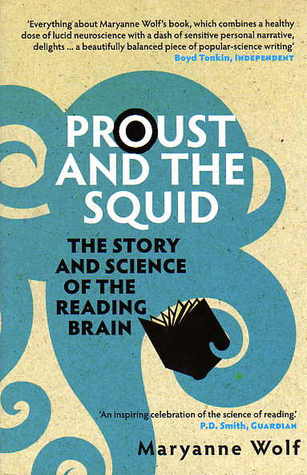My ongoing self-directed professional development in the field of translations sends me deep into the academic and coursebook stacks at Stockholm University, most often within the linguistics section. On my last visit, Proust and the Squid caught my eye—what a title!—and, after just a moment’s hesitation, I added it to my stack.

Author: Maryanne Wolf
My GoodReads rating: 5 stars
Average GoodReads rating: 3.8
Language scaling: C1
Summary: Wolf sketches a short history of reading and the written language within a neurological framework, and hypothesizes about the neurological basis for dyslexia and other reading disorders.
Recommended audience: Elementary school teachers; special education teachers; book lovers; dyslexics
In-depth thoughts: I wasn’t expecting Proust and the Squid to be as good as it was, and I went into it expecting to enjoy it. Wolf manages to make complex neuroscience accessible to the layperson.
I debated whether to give this 4 or 5 stars. For anyone who works with young learners, this is a solid 5 stars. Wolf’s approach to typifying reading disorders and pinpointing what seems to be happening in the brain in these situations will no doubt prove useful for teachers, tutors, or parents with dyslexic children. I imagine it would be interesting to special education teachers as well, though maybe much of what Wolf touches on here would be covered in even greater detail over the course of a special education degree. Adult dyslexics might also appreciate understanding the neuro- and physiological foundations of reading and what’s happening in their brains in particular.
For the general public, I would say it’s only 4 stars, only because while the history of reading and the brain is fascinating for me, its immediate relevance to everyday life is more oddity than urgent. Wolf is largely accessible when writing about the hard science, but she tends towards to err on the side of obscurity rather than simplicity. It’s largely for that reason I would consider this a difficult book for English students (unless they were particularly motivated.) I’ll certainly have to read Proust and the Squid a few times to really appreciate it. It’s also been over a decade since the initial publication. I’d love to read an updated edition and see if there have been any new breakthroughs.

One thought on “Proust and the Squid”